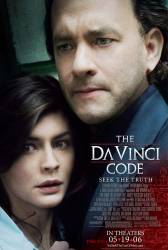Continuity mistake: When Sophie gets out of the back of the armored truck, she is not carrying anything and, again, as she is running along the side of the armored truck to get into the passenger's side, we see both hands and she isn't carrying anything. A couple of scenes later, as she and Robert walk up the steps to Chateau Villet, she is carrying her gray overcoat and handbag. They can be seen even better when Teabing is kissing her hand in welcome.
Suggested correction: They would have been left in the back of the truck and after escaping easily retrieved before arriving at the chateau.
Plot hole: Fache says he believes Langdon killed all those people because Aringarosa told him Langdon came to him in confession over the murders. We know Langdon made no such confession, so what made Aringarosa involve Langdon in the murders in the first place? Aringarosa never saw the curator's daily planner, his email, and wasn't there to see the message on the floor, so other than Langdon conveniently being in town for his book signing, why did Aringarosa name Langdon? If he was just telling that to Fache so he would have someone to arrest, Aringarosa could have named anyone.
Suggested correction: After Aringarosa is shot, Fache questions him and says (speculating) one of his followers saw the crime scene photos and called him, and the Bishop's response implied he was correct. Therefore, the Bishop knew Langdon was named in the floor writing before he called Fache, and given Langdon's work in the area of religious symbols it is very conceivable the Bishop knew who Langdon was, so named Langdon in an attempt to foil whatever Sauniere had intended.
Suggested correction: The book says, there's this guy 'the teacher' who knows a lot about what's going on. It's not unthinkable that Aringarosa heard it from him, so I wouldn't call this a plothole.
Character mistake: Langdon points out that the Templars were slaughtered on October 13th, 1307, and Sophie comments, "Friday the 13th", implying that this is when the fear of Friday the 13th originated. In reality, fear of Friday the 13th didn't really begin until early in the 20th century.
Suggested correction: While many do believe that it's just a myth that the origins of Friday the 13th being considered unlucky are due to the Knights of Templar being arrested on a Friday the 13th, that's pretty much what the whole series is based on; origins of myths being real. Plus it should be noted that Friday the 13th being considered unlucky has been written about since the middle of the 19th century, so it did not begin in the early 20th century. However, the origins of the day being unlucky can be traced much further back. Chaucer wrote about Friday being unlucky in "The Canterbury Tales" (1387) and the myth of the number 13 being unlucky can be traced to much earlier origins (said to be unlucky because there were 13 at the Last Supper).





